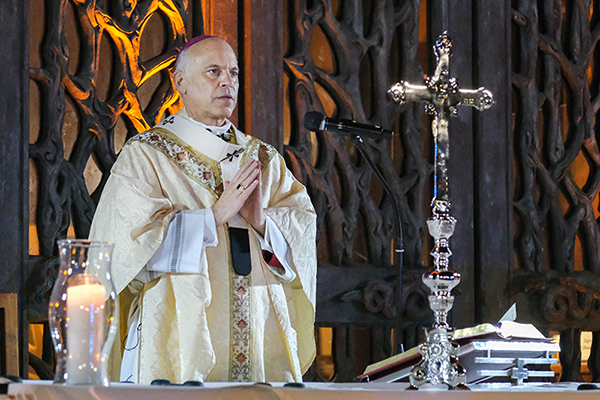NEW YORK — Archbishop Salvatore Cordileone of San Francisco has become the latest American bishop to advocate barring Catholic public figures who support abortion rights from communion, as the debate on the topic continues to grow since President Joe Biden, the country’s second Catholic president and a pro-choice Democrat, took office.
Archbishop Cordileone’s letter is also significant because House Speaker Nancy Pelosi, another pro-choice Catholic Democrat, resides in the Archdiocese of San Francisco.

“Our responsibility to the rest of the Catholic community is to assure them that the Church of Jesus Christ does take most seriously her mission to care for ‘the least of these,’ as Our Lord has commanded us, and to correct Catholics who erroneously, and sometimes stubbornly, promote abortion,” wrote Archbishop Cordileone.
[Related: Canon Law Complicates Communion Debate]
“This correction takes several forms and rightly begins with private conversations between the erring Catholic and his or her parish priest or bishop,” he continued. “Because we are dealing with public figures and public examples of cooperation in moral evil, this correction can also take the public form of exclusion from the reception of Holy Communion.”
This isn’t the first time Archbishop Cordileone has waded into these waters.
In January, Archbishop Cordileone issued a public correction of Pelosi after she took part in a podcast with Hillary Clinton and asserted that pro-life Catholic voters had helped elect Donald Trump, thereby being “willing to sell the whole democracy down the river on that one issue.” Archbishop Cordileone replied that Pelosi stood “in direct contradiction to a fundamental human right that Catholic teaching has consistently championed for 2,000 years.”
The new letter, “Before I Formed You in the Womb I Knew: A Pastoral Letter on the Human Dignity of the Unborn, Holy Communion, and Catholics in Public Life” was published on May 1. The U.S. bishops are expected to collectively take up the issue of whether or not public figures who support abortion should present themselves for communion at their June meeting.
Last November, Archbishop José Gomez of Los Angeles, president of the U.S. Bishops’ Conference, announced the creation of a working group to navigate the “difficult and complex situation” that is Biden’s support for abortion.
The result of the working group, which Archbishop Gomez announced finished its work in February, was an Inauguration Day letter from Archbishop Gomez to Biden where he claimed the policies Biden supports related to abortion, contraception, marriage, and gender “would advance moral evils and threaten human life and dignity.”
The other recommendation from the working group was to create a document addressing the issue of communion. The task was given to the Committee on Doctrine and will be the subject of the conversation at the June meeting.
In addition to Archbishop Cordileone, among the prelates who have publicly supported banning Biden from communion include retired Archbishop Charles Chaput of Philadelphia and Cardinal Raymond Burke. Others, such as Bishop James Wall of Gallup, expressed support for Archbishop Cordileone’s pastoral letter after it was released.
On the other side of the debate, Bishop Robert McElroy of San Diego called denying Biden or other political leaders of communion “very destructive.”
“I do not see how depriving the President of other political leaders of Eucharist based on their public policy stance can be interpreted in our society as anything other than the weaponization of Eucharist,” Bishop McElroy said in February.
Cardinal Wilton Gregory of Washington, along with recently retired Bishop Francis Malooly of Wilmington, who has pastoral responsibility towards Biden, have both previously stated they wouldn’t deny Biden communion. Monsignor William Koenig, who will succeed Bishop Malooly, didn’t give a straight answer when reporters asked the question earlier this week.
As for Archbishop Cordileone’s 17-page pastoral letter, it’s broken down into four sections where he discusses: the gravity of the evil of abortion, how Catholics can avoid “sinful” cooperation in the moral evil, the meaning of choosing to receive the Holy Eucharist, and the responsibilities of Catholics in Public Life.
In the beginning, Archbishop Cordileone emphasized that the Catholic Church is “far from being “preoccupied” with abortion, and cited opposing racism, fighting for the rights of the oppressed, assisting the sick and elderly, and working for economic equality as other areas where the church focuses its efforts. He also re-emphasized that abortion remains the “preeminent issue.”
Archbishop Cordileone also decries the fact that “it is not uncommon for the very people who should help her (the father of the child, her family and friends) to encourage and even pressure her to have an abortion. Abortion is never solely the mother’s act.”
“Others, to a greater or lesser degree, share culpability whenever this evil is perpetrated,” Archbishop Cordileone wrote.
He further noted that anyone that pressures or encourages the mother to have an abortion, that pays for it, provides financial assistance to organizations to provide abortions, or supports candidates or legislation that will make abortion more readily available “are all cooperating with a very serious evil.
Finally, in addition to his advocating for barring public figures who support abortion from communion, he also wrote that they should make the choice themselves.
“If you find that you are unwilling or unable to abandon your advocacy for abortion, you should not come forward to receive Holy Communion,” the archbishop wrote.
